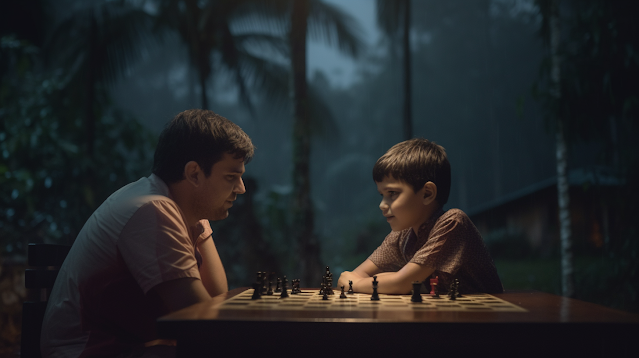Chess: A Timeless Game for the Aging Mind | Chess for kids "Age is something that doesn't matter unless you are a cheese." - ...
Chess: A Timeless Game for the Aging Mind | Chess for kids
"Age is something that doesn't matter unless you are a cheese." - Luis Bunuel
Viswanathan Anand as kid and seniorIn the midst of technological advancements and constant change, one ancient game has endured, outlasting fleeting trends and managing to captivate both young and old minds alike. This game is chess, a classic embodiment of strategy, foresight, and wit. For older adults, chess is not merely a pastime but a tool of remarkable potential for cognitive health, mental wellness, and social connectedness.
Despite its veneer of simplicity, chess is an intricate dance between the pieces on the 64 square board. It is a game where victory and defeat hang in the balance of a single decision, echoing life's delicate, unpredictable dance. For the aging, it offers a unique blend of cognitive stimulation and meaningful engagement.
Viswanathan Anand as kid and seniorIn this article, we delve into the enchanting world of chess, highlighting its benefits for older adults and revealing why we need to ensure the game is part of our golden years.
A Game of Strategy and Wisdom: Chess as a Cognitive Enhancer
Scientific research has confirmed the age-old belief that engaging in cognitive activities can help maintain cognitive function as we age. And when it comes to cognitive stimulation, few activities are as potent as chess.
Cognitive Health: Research has demonstrated that activities like chess can stimulate brain function, improve memory, enhance concentration, and promote logical thinking, all of which can delay the onset and slow the progression of cognitive disorders like Alzheimer's and dementia 1. The process of predicting an opponent's moves, planning strategies, and adapting to changing circumstances can act as a mental workout, keeping the brain active and engaged.
Magnus Carlsen as kid and seniorBrain Plasticity: Even in old age, the brain is capable of plasticity, a fancy term for the ability to form new neural connections. Engaging in cognitively challenging activities like chess promotes this plasticity, leading to improved cognitive function 2.
Memory Retention: Remembering the rules of chess, the unique moves of each piece, and previous matches can act as a form of memory training. A study found that individuals who engaged in mentally stimulating activities had a slower memory decline compared to those who did not 3.
Chess: A Game of Connections
Beyond cognitive benefits, chess also offers social benefits. As a game, chess bridges the gap between individuals, creating a common platform for interaction and connection.
Viswanathan Anand as kid and seniorSocial Interaction: Chess clubs offer a wonderful platform for older adults to interact and connect, reducing feelings of loneliness and isolation. Being socially active is linked to a lower risk for mental health issues and better overall wellbeing 4.
Intergenerational Connections: Chess provides an opportunity for intergenerational connections, allowing older adults to play and engage with younger individuals. Such interactions can offer psychological benefits and contribute to the overall happiness and satisfaction in life 5.
Magnus Carlsen as kid and seniorAn Ageless Game of Life
Life is unpredictable, a challenging game of choices and consequences. So is chess. And for older adults, chess can mirror life, encouraging them to strategize, to remember, to adapt, and to face their challenges with courage and grace.
Age may be inevitable, but cognitive decline is not. Chess, with its intricate moves and countless strategies, serves as a lifeline, keeping minds sharp, souls engaged, and hearts connected. So let's dust off the old chessboards and embrace the game that transcends the barriers of age, fostering an ageless mind amid the relentless march of time.
References:
[1] "Leisure Activities and the Risk of Dementia in the Elderly", NEJM, Retrieved from https://pubmed.ncbi.nlm.nih.gov/20182035/
[2] "Experience-dependent plasticity in white matter microstructure: Reasoning training alters structural connectivity", Frontiers in Neuroanatomy, Retrieved from https://www.ncbi.nlm.nih.gov/pmc/articles/PMC4138486/
[3] "Mental stimulation and Alzheimer's Disease: A Quantitative Synthesis", The Journal of Aging Research, Retrieved from https://pubmed.ncbi.nlm.nih.gov/23103437/
[4] "Social Relationships and Depression: Ten-Year Follow-Up from a Nationally Representative Study", PLOS ONE, Retrieved from https://pubmed.ncbi.nlm.nih.gov/24122819/
[5] "Benefits of Social Activities for Aging Adults", Current Gerontology and Geriatrics Research, Retrieved from https://www.ncbi.nlm.nih.gov/pmc/articles/PMC5783754/

















No comments